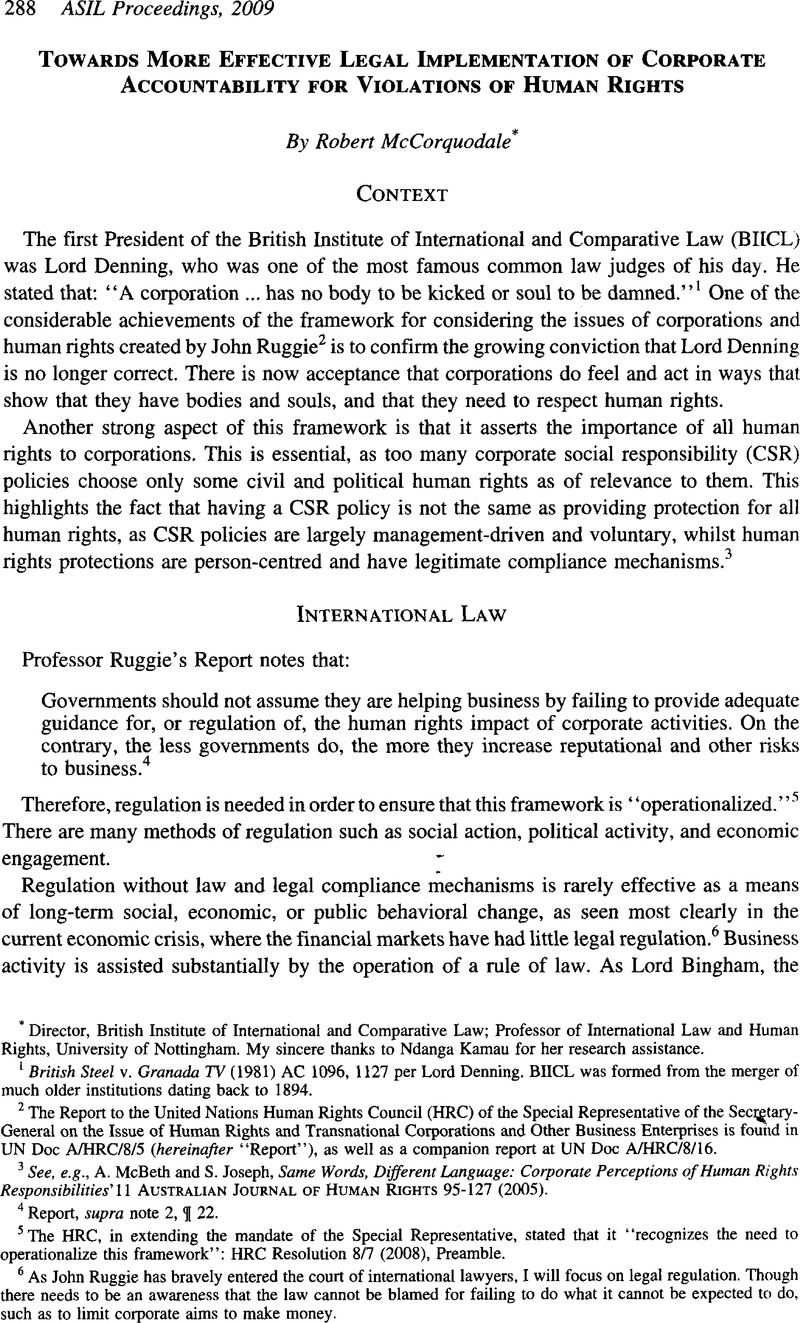No CrossRef data available.
Article contents
Towards More Effective Legal Implementation of Corporate Accountability for Violations of Human Rights
Published online by Cambridge University Press: 28 February 2017
Abstract

- Type
- The Future of Corporate Accountability for Violations of Human Rights
- Information
- Copyright
- Copyright © American Society of International Law 2009
References
1 British Steel v. Granada TV (1981) AC 1096, 1127 per Lord Denning. BIICL was formed from the merger of much older institutions dating back to 1894.
2 The Report to the United Nations Human Rights Council (Hrc) of the Special Representative of the Secretary-General on the Issue of Human Rights and Transnational Corporations and Other Business Enterprises is found in UN Doc A/HRC/8/5 (hereinafter “Report”), as well as a companion report at UN Doc A/HRC/8/16.
3 See, e.g., McBeth, A. and Joseph, S., Same Words, Different Language: Corporate Perceptions of Human Rights Responsibilities’ 11 Australian Journal of Human Rights 95-127 (2005)Google Scholar.
4 Report, supra note 2, ¶ 22.
5 The HRC, in extending the mandate of the Special Representative, stated that it “recognizes the need to operationalize this framework”: HRC Resolution 8/7 (2008), Preamble.
6 As John Ruggie has bravely entered the court of international lawyers, I will focus on legal regulation. Though there needs to be an awareness that the law cannot be blamed for failing to do what it cannot be expected to do, such as to limit corporate aims to make money.
7 Lord Bingham has indicated that a rule of law requires good governance consistent with justice and human rights, that everyone is accountable to the law (including governments and those with power), that everyone can have disputes settled in an independent and accessible way, and that there are compliance checking mechanisms: LordBingham, (Tom), The Rule of Law, 66 Cambridge Law Journal 67 (2007)CrossRefGoogle Scholar.
8 See D. Kaufmann, A. Kraay, & M. Mastruzzi, Report from the World Bank on the Link between the Rule of Law and GDP, Governance Matters (2005), available at <http://www.worldbank.org/wbi/governance> (last visited Mar. 3, 2009).
9 See McCorquodale, R. & Simons, P., Responsibility Beyond Borders: State Responsibility for Extraterritorial Violations by Corporations of international Human Rights Law, 70 Mod. Law Review 599-626 (2007)CrossRefGoogle Scholar.
10 For example, with military contractors and others in Iraq: see Bina, M., Private Military Contractor Liability and Accountability After Abu Ghraib, 39 J. Marshall L. Rev. 1237 (2005)Google Scholar.
11 See McCorquodale & Simons, supra note 9.
12 Indeed, the Human Rights Council uses the term “responsibility” for both states and corporations: HRC resolution 8/7, Preamble.
13 See, e.g., S. Schlesinger & S. Klnzer, Bitter Fruit: The Untold Story of the American Coup in Guatemala (1982), 90-97.
14 See Torture as Tort (C. Scott ed., 2001). There is also the possibility of joint liability at the international level of a state and a corporation in the same way as it can occur within many states’ national laws, and with a change of burden of proof in some instances.
15 Although there has been considerable discussion on the Report in terms of the extent to which corporations can have individual responsibility for international crimes, I am not going to deal with this issue here, though I note that a number of states enable criminal laws to apply to corporations without needing an individual within the corporation to be directly linked to the criminal activity: see, e.g., Italian statute Decreto Legislativo 231#, 2001, and Australian Commonwealth Criminal Code 1995.
16 This is particularly important as gender perspective needs to be integrated under the mandate: HRC resolution 8/7, supra note 5, ļ 4(d).
17 OECD, The OECD Guidelines for Multinational Enterprises, OECD Declaration and Decisions on International Investment and Multinational Enterprises: Basic Texts (DAFFE/IME, 2000). Note that most transnational corporations have their home state in an OECD state: see UNCTAD World Investment Report 2005: Transnational Corporations and the Internationalization of R&D (2006).
18 Global Witness v. Afrimex Ltd, UK National Contact Point, Aug. 28, 2008, available at <http://www.berr.go-v.uk/files/file47555.doc> (last visited Jan. 26, 2009). Afrimex Ltd. was a UK corporation and so the case was brought before the UK National Contact Point (NCP), being the relevant supervisory body under the Guidelines. The claim was that Afrimex paid bribes to a rebel group and purchased from mines in the Democratic Republic of Congo where child labor and forced labor were being used. Some of this activity occurred through corporations not registered in the UK. The NCP required the corporation to formulate an appropriate CSR policy and put it into effective practice.
19 See, e.g., the OECD Risk Awareness Tools for Multinational Enterprises in Weak Governance Zones.
20 See, e.g., M. Darrow, Between Light and Shadow, The World Bank, The International Monetary Fund and International Human Rights Law (2003).
21 See, e.g., the approach of the Extractive Industries Transparency Initiative, available at <http://eitransparency.org/> (last visited Mar. 3, 2009).
22 The use of a wiki resource by John Ruggie’s team is a very good one, though limited to those in the world with access to reliable electricity and unfettered Internet access.




